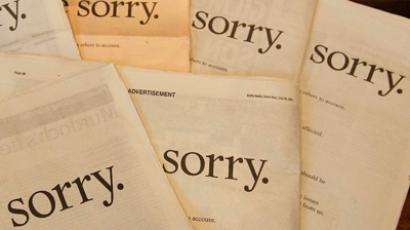Risky and provocative ads – offensive?
Advertisement of the Pope kissing an Imam and the US president planting a wet one on China’s leader, as well as merchandise pushing the boundaries, have been creating a storm of accusations of insensitivity, intolerance and even bigotry.
“Any ad you do these days that's at least a little bit creative is likely to offend somebody,” said news commentator TJ Walker. In an age of over the top demands for political correctness, attention-grabbing headlines and images are increasingly popular.An Irish yoga baseball cap infuriating the Irish community, and even a T-shirt with a positive message creating outrage in the US.“Oh my god, this is ridiculous. OK, transgender activists were upset that a transgender model wore a t-shirt that said ‘gay is ok’,” said political comedian Katie Halper. So do the offended have a point? Or are they just too sensitive?The Vatican demanded that the ads with the pope be scrapped after denouncing it as “unacceptable provocation.”“The Vatican needs to chill out, in general,” said editorial columnist and author Ted Rall. It’s no secret, that advertising companies who shock and create scandal profit the most.“If I were working on Madison Avenue, I would definitely be working the controversy card as much as possible. We know that edgy works. The metrics show it on television, they show it online – edgy always works,” said Rall.The new-found respect for “correctness” is recent, yet often hypocritical.“Things went wrong in the 1980s and 90s, when it became not OK to use, for example, sexist language. You couldn't call a woman a ‘bitch’ any more, but you could still pay her 70 cents on the dollar for every dollar that a man earned,” explained Rall. The list of those offended grows by the day.“If I wanted to, I could probably organize a group today, of color blind middle-aged balding guys who are offended at how we are portrayed in the media, I’ve got better things to do though,” said TJ Walker. While passions over advertising peak, real issues with shocking truths have a hard time getting traction. “If I were the Vatican, I would be more upset about real kissing going on in the church, between priests and real life kids, than I would be about some Photoshop thing,” said Halper. While companies creating scandals win either way by getting to milk the publicity they receive, those getting upset are largely wasting time that could be better spent on campaigns more meaningful than rage.














